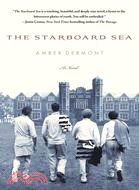The Starboard Sea
商品資訊
ISBN13:9780312642808
替代書名:The Starboard Sea
出版社:St Martins Pr
作者:Amber Dermont
出版日:2012/02/28
裝訂/頁數:精裝/310頁
規格:22.2cm*15.9cm*3.2cm (高/寬/厚)
商品簡介
"A rich, quietly artful novel that is bound for deep water, with questions of beauty, power and spiritual navigation as its main concerns. The title refers not to the right side of a boat but to the right course through life, and the immense difficulty of finding and following it."--Janet Maslin, The New York Times
A powerful first novel about life and death, friendship and love, as one young man must navigate the depths of his emotions.
JASON PROSPER grew up in the elite world of Manhattan penthouses, Maine summer estates, old-boy prep schools, and exclusive sailing clubs. A smart, athletic teenager, Jason maintains a healthy, humorous disdain for the trappings of affluence, preferring to spend afternoons sailing with Cal, his best friend and boarding-school roommate. When Cal commits suicide during their junior year at Kensington Prep, Jason is devastated by the loss and transfers to Bellingham Academy. There, he meets Aidan, a fellow student with her own troubled past. They embark on a tender, awkward, deeply emotional relationship.
When a major hurricane hits the New England coast, the destruction it causes brings with it another upheaval in Jason's life, forcing him to make sense of a terrible secret that has been buried by the boys he considers his friends.
Set against the backdrop of the 1987 stock market collapse, The Starboard Sea is an examination of the abuses of class privilege, the mutability of sexual desire, the thrill and risk of competitive sailing, and the adult cost of teenage recklessness. It is a powerful and provocative novel about a young man finding his moral center, trying to forgive himself, and accepting the gift of love.
作者簡介
AMBER DERMONT received her MFA in fiction from the University of Iowa Writers’ Workshop. Her short stories have appeared in numerous literary magazines and anthologies, including Dave Eggers’s Best American Nonrequired Reading 2005, Francis Ford Coppola's Zoetrope: All-Story, and Jane Smiley’s Best New American Voices 2006. A graduate of Vassar College, she received her Ph.D. in creative writing and literature from the University of Houston. She currently serves as an associate professor of English and creative writing at Agnes Scott College in Decatur, Georgia and is also the author of the story collection Damage Control.
名人/編輯推薦
"Dermont draws the tony campus life in "The Starboard Sea" with an insider's hand. Dermont is a seasoned sailor, and readers in Annapolis will get a charge out of her exact, salty depictions of nautical rigging, knots and gear. She also writes vividly about the strategy of sailing. One of the most refreshing aspects of the novel is Dermont's candid treatment of race. Jason has been compared to Nick Carraway for his sober narration and keen sensitivity to the decadence of his peers, and in more than a few instances "The Starboard Sea" feels like a distant cousin of "The Great Gatsby."-- The Washington Post
"With unflinching wit, Amber Dermont examines the harsh vicissitudes of life, and though the worlds she creates are often unsettling places, her sense of detail always makes for a pleasurable read. There is a vibrant lucidity to her language, a daring music...Her characters are simultaneously able to articulate their pain, pass judgment on their own behavior and pardon themselves for their transgressions." -MARILYNNE ROBINSON, Pulitzer Prize and Orange Prize winning author of Gilead and Home
"The Starboard Sea is a touching, beautiful and deeply wise novel, a hymn to the bittersweet glories of youth. You will be enthralled." -JUSTIN CRONIN, New York Times bestselling author of The Passage
"In this affecting debut novel, Amber Dermont reveals herself as a writer of striking and abundant talent, sounding the depths of her narrator through his actions, yes, but even more so through the rhythms of his mind, so that you truly feel as if you are inhabiting his life along with him." -KEVIN BROCKMEIER, author of The Illumination and The Brief History of the Dead
"The Starboard Sea is a moving story of a young man coming to terms with who he is and what he has done. Dermont creates a powerfully real world. The sailing scenes are breathtaking, and the characters are complex and fully imagined. This is the debut of an enormously gifted writer." -ROBERT BOSWELL, author of The Heyday of Insensitive Bastards and Century's Son
"Amber Dermont's beautiful first novel explores just what it should: the dangers and joys of emergence into adulthood. Dermont has an extraordinarily observant eye and an elegant voice, and she illuminates particular aspects of her world-sailing, gender, class- with intelligence and compassion. Brava for this impressive debut." -ROXANA ROBINSON, author of Cost and Sweetwater
"Amber Dermont has conjured up a preppy hall of mirrors, filled with hauntingly complex characters, grand houses and borrowed art, privilege and paybacks, and friendship touched with malice. The Starboard Sea blends propulsive mystery, lost love, and mournful coming of age into something layered, wise, and completely riveting." -MICHELLE WILDGEN, author of But Not For Long and You're Not You
"The Starboard Sea is a beautifully layered novel with an authenticity that takes the reader beyond the clichés of rich preppies and exposes a world that is vivid, compelling, and heart wrenching. With it, Amber Dermont establishes herself as an exciting new American talent." -MARK JUDE POIRIER, author of The Worst Years of Your Life and Goats
"In a series of seemingly effortless strokes, Amber Dermont's Starboard Sea has brought to life one of America's great literary outcasts. Set adrift in a storm of his own making, Dermont's Jason Prosper takes us on a journey into the darker depths of our human capabilities. Damaged and dangerous, by turns as despicable as he is lovable, Prosper's voyage is a treasure from a writer of dazzling gifts." -HOLIDAY REINHORN, author of Big Cats
"Amber Dermont illuminates the bizarre and insular world of boarding schools in her debut novel The Starboard Sea, and her young narrator, Jason Prosper, is captivating. His is a unique voice, searching and full of heart. The Starboard Sea is sharp, funny, smart, and vastly entertaining." -VICTORIA PATTERSON, author of Drift (Story Prize Finalist) and This Vacant Paradise
"The Starboard Sea is a touching, beautiful, and deeply wise novel, a hymn to the bittersweet glories of youth. You will be enthralled." -JUSTIN CRONIN, New York Times bestselling author of The Passage
"Vividly written. Dermont shows real spark in her sensual descriptions of sailing and her realistic depiction of the malevolent dynamics among sophisticated teens...." -BOOKLIST
書摘/試閱
"Don't worry about me," Max said. "I get paid to look this pretty." Max helped me load the car and wished me good luck. "It's your senior year," he said. "Enjoy yourself."
My mother was still on vacation in Maine. It occurred to me that the only soul in all of New York City I would miss would be my doorman. "Take care, Boss," I said and slid into the driver's seat.
Once on the road, Dad turned down the air-conditioning. I could feel the heat radiating off the dashboard as we cruised away from Manhattan, weaving along the East River, headed for the coast of Massachusetts. Dad sat beside me in the passenger seat, alternating between the Wall Street Journal and Forbes. Every few minutes, he checked the road over his bifocals. "Jason Kilian Prosper, this isn't a race."
My father was tall, with a good two inches on me, three on my older brother, Riegel; the Cadillac was custom-designed with extra depth and legroom. A pair of life jackets could have been stowed in the space beyond his outstretched legs. Still, my father struggled for comfort. He lifted his left knee toward his chest, wincing when the bones cracked. His blue linen pants remained crisp in the damp heat. Even in pain, Dad sat composed and pleated, looking less like a dad and more like a member of the British House of Lords.
According to my father, I was "damaged goods." Selling me to another school wasn't going to be easy. This was the summer of 1987, the year of damaged goods: Oliver North and paper shredders, Gary Hart and Monkey Business, record-high AIDS, and a record-high stock market. That spring, Mathias Rust, just one year older than me, eager for a thrill, had evaded Soviet air defenses and landed his Cessna 172B in Red Square. That fall, the entire country would be riveted for two and a half days, as rescue workers in Midland, Texas, plotted to pull a baby from an abandoned well. And in the meantime, I had gotten myself banished from Kensington Prep and was about to start my senior year at Bellingham Academy.
"What's the drill?" I asked, breaking our silence. "Drinks with the headmaster? Nine holes of golf?"
Dad folded his newspaper into a tight, narrow column. "The headmaster is out of town. We're meeting with the dean. Dick Warr."
"I hope he lives up to his name," I said.
"Try behaving for once."
"I stopped behaving myself a long time ago." The needle fanned over seventy-five. Before Dad noticed, I decelerated, slightly.
"Just graduate." Dad scanned his newspaper. "Finish up for your mother. The poor woman. She doesn't like to show her face in public anymore."
"So I'm the reason Mom leaves the apartment in disguise. Go figure."
"Your brother never speaks to me that way." Dad cracked the side of my head with the Journal. His weapon of choice.
I don't think he meant to hurt me, but the impact and surprise caused me to swerve. The corner of the paper struck my right eye, knocking it shut and, for a brief instant, I let go of the wheel. Imagined us hitting the guardrail, the Cadillac embraced by an elbow of metal.
"Get control of yourself, for God's sake!" Dad pulled the steering wheel back in line.
For the rest of the trip, I half daydreamed and half drove, the car flipping forward and crushing Dad's body. Leaving me to surgically excise what little was left of my dad from the wreckage. Snapping his legs off cleanly at the knees. No blood. Just bones and sockets, white as a whale's tooth. On one knee, I'd scrimshaw the word "left," and on the other, "right." Neat and orderly. During long trips, the legs could be packed into one of those cases ventriloquists use to store their dummies. At last, Dad would no longer be in pain. His linen pants would drape and rest like opera curtains on the carpeted car floor.
"Pull over at the next rest stop. Time for me to drive."
Our near accident had been his fault. For some parents, having children meant full absolution from any future mistakes. My father wouldn't permit himself to be wrong. He shifted the blame of misplaced scissors, rising interest rates, and iceless ice cube trays all onto Riegel and me. Dad cheated on our mom and told our mom it was her fault he cheated on her.
My mother really had left our apartment in disguise. Decoyed in a rotating masquerade of ginger-haired wigs and cat's-eye sunglasses, she'd chased after my dad and his harem.
Mom and I had spent the earlier part of that summer at our cottage in Maine. Our mornings devoted to relaxing on wicker porch chairs, watching the Iran-contra hearings, mixing champagne with grapefruit juice. As the men on the TV bragged and lied, denying their accomplishments, my mother turned the sound to mute and spoke to me about my father's indiscretions.
"Of all your father's mistresses, my favorite was this knock-kneed Eastern European hussy he would lug around on business trips, this woman Gayla, a dozen years his junior. Called her his 'administrative aide.' Gayla the Flying Whore is what I called her. I followed them once on a nonstop to the Caymans. Your father didn't notice me in my red wig coming down the aisle to claim my seat in coach. He was preoccupied with his first-class hot towels, with brushing the white cloth against her neck. That woman took forever to get off the plane. Commandeering the aisle, prattling on to the flight crew while the rest of us cooled our heels. The way that woman laughed, with her teeth. I never laughed that way." My mother swept the champagne flute to her lips, then confirmed that she was ready to hunt a new breed of Gaylas. From under her wicker seat, Mom pulled out a hatbox, opened the top, and withdrew a mass of chocolate ringlets. "My latest disguise." She twirled the hairpiece on her fist and said, "When you were little, I caught you and Riegel with one of my old wigs. Remember? The hair all matted like a rat's nest."
"We used it to play tag. Chasing each other, then forcing the loser into the wig." Riegel had made up this game as a way of torturing me. A brittle net material covered the inside of the hairpiece, and my brother the bully liked to pull it over my nose and push the scratchy lining into my face. The suffocation became my own definition of blindness. Not an absence of light, but a prickling concealment. A rough and painful mask.
"I guess we both played games with the damn thing," Mom said.
Mom was wrong to tell me about Dad. To let me know that he cheated and to make me afraid of the ways he could hurt me. He was a swindler passing for a saint, and as I sat beside him in his big American luxury car, I thought, "Be careful, Dad. I'm on to you."
* * *
My father had his wild streak, but he drove his Cadillac slow and steady like a grandma rocking a baby to sleep. It took us all afternoon to reach our destination. We exited the highway and a wooden historical marker welcomed my father and me to the small Atlantic village of Bellinghem, spelled with an "e." Another sign, this one metal and posted just a few yards away, welcomed us to Bellingham Academy. It was impossible to tell where the school ended and the town began. A run of dorms resembled coach houses. Fenced roads between the dormitories felt like estate driveways. I'd been to Bellingham twice before for dinghy races. My sailing partner Cal and I had won our individual races but lost both regattas to the home team. They sailed high-performance Fireballs and had an ocean advantage over schools like Kensington that practiced on lakes with shifty winds. As I stared at the waterfront, the color and movement on the ocean created an optical illusion in my mind. The entire school appeared to float on water, like a life raft. I felt weightless. The rhythm of the waves reminded me of naval hymns, of songs about peril and rescue.
Most of us who found ourselves at Bellingham had been kicked out of better schools for stealing, or having sex, or smoking weed. Rich kids who'd gotten caught, been given a second chance, only to be caught again then finally expelled. We weren't bad people, but having failed that initial test of innocence and honor, we no longer felt burdened to be good. In some ways it was a relief to have fallen. To have fucked up only to land softly, cushioned, as my dad reminded me, "by a goddamn safety net of your parents' wealth." Bellingham offered us sanctuary, minimal regulations, and a valuable lesson: Breaking rules could lead to more freedom. Because the school catered to thieves, sluts, and dope fiends, it was understood that additional transgressions would be overlooked. If you could pay, you could stay. I comforted myself knowing that I'd lowered all future expectations. So long as I didn't torch my dormitory or poison my hall mates, I was free to take full advantage of the lax standards and leniency. But all this freedom would indeed cost me something: a stain on my reputation. I'd been Bellinghammed. It was almost as bad as winding up at Choate.
* * *
Dad parked in front of the Academic Center, a modern two-story building that clashed with its traditional surroundings. While the outside walls were dressed in silvery cedar shingles, the roof wore a crown of glass. A massive arch of shiny blue windows curved atop steel rafters. A giant dorsal fin. Either the building was masquerading as a fish or a fish was moonlighting as a building.
"Monstrosity," Dad said, slamming the car door. "How many donors does it take to screw up a building?"
"Looks like a barracuda," I responded.
All over campus, parentless students raced about wearing Vuarnet sunglasses and Hard Rock Cafe T-shirts. Happy delinquents newly freed from their families. A tribe of boys stood in a circle playing Hacky Sack. Each one wore a brightly colored woven Guatemalan belt tied around his waist like a signal flag.
My father took great pride in introducing me to the men in charge. His way of taking care of his son. We entered the Academic Center and found Dean Warr's office. Dad told me to wait in the lounge, so I slid into the bucket seat of a brown leather chair. At my father's request, I'd thrown on a blue blazer and a red tie decorated with dark blue sailboats. The tie was a gift from Ted Turner, commemorating the ten-year anniversary of his victory at the America's Cup. I'd swiped it from my dad. I looked entirely presentable except I'd forgotten to wear socks. My ankles stuck out all white and hairy, and I was worried Dad would notice, criticize me. In a few minutes, I heard laughter. The distinct sound of hands slapping backs. I stood up and pulled my pant cuffs down to my loafers.
"Dick, I'd like you to meet my son, Jason. Jason, this is Mr. Warr."
The dean had a broad back, a narrow waist. He smelled like limes and wore the school's colors: a maroon jacket and blue pants. The sport coat sleeves stopped short around his wrists. We shook hands. He invited me into the bright white light of his office. Dad waited outside.
The office had a view of some newly planted saplings.
"Your father tells me you're quite the sailor." He sat down behind his desk.
"When the wind is strong," I said and found a chair to sit in.
"I think we SeaWolves have a lock on the Tender Trophy this year." Dean Warr leaned forward on his elbows.
"That's tremendous, truly." I nodded, flashing my teeth and folding my left leg across my right knee. I covered the bare ankle with my hand.
"We'll get you set up with Mr. Tripp, the head coach."
The dean's facial expression reminded me of a clown's smiling face lacquered onto a plastic Halloween mask. I wanted to reach over, grab the mask by its bulbous nose, and snap the cheap elastic string against his ears. A reverse slingshot.
"Your father's an important man. He's shared his deep concern over your future. At Bellingham, we specialize in fresh starts, second chances." The dean raised both of his eyebrows but tilted his head, so it appeared that only the right brow was lifted.
"I just hope to graduate in the spring," I said.
"In the meantime, enjoy yourself. Our girls are grade-A fresh. Not like that monastery Kensington. I bet it can get lonely in those boys-only woods." Dean Warr continued smiling, his lip sat caught on his teeth like a crook on a barbed-wire fence.
I said nothing in response but wondered what my father had told this man.
"Good." He stood up. "No more questions."
Up to this point, I hadn't asked him any. I didn't move out of my chair, felt welded to it. "I was wondering if you could tell me how they named the school."
"After the town and the Bellinghem family," he said.
"But they're spelled differently. I noticed driving up. Thought there might be a story. Some history."
"The 'a' looks better on the letterhead." Still smiling, he opened the door of his office and checked his watch.
主題書展
更多書展購物須知
外文書商品之書封,為出版社提供之樣本。實際出貨商品,以出版社所提供之現有版本為主。部份書籍,因出版社供應狀況特殊,匯率將依實際狀況做調整。
無庫存之商品,在您完成訂單程序之後,將以空運的方式為你下單調貨。為了縮短等待的時間,建議您將外文書與其他商品分開下單,以獲得最快的取貨速度,平均調貨時間為1~2個月。
為了保護您的權益,「三民網路書店」提供會員七日商品鑑賞期(收到商品為起始日)。
若要辦理退貨,請在商品鑑賞期內寄回,且商品必須是全新狀態與完整包裝(商品、附件、發票、隨貨贈品等)否則恕不接受退貨。













